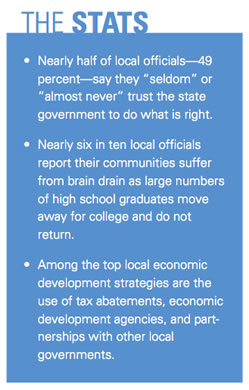
Mounting evidence suggests that an economic recovery is in view. Unemployment isn't rising as quickly as it once was. Consumer spending has increased for four consecutive months. Household net worth is growing.
While the economy may be turning around for the general public, local government agencies are likely to feel the aftershocks for some time.
"There's a lag to the effect on local government," explains Tom Ivacko (MPA '93), program officer at the Ford School's Center for Local, State, and Urban Policy (CLOSUP). "So, for many places, the worst is yet to come." Because local governments depend on tax revenue and federal and state allocations, it takes longer for them to feel the effects of an economic downturn—and an economic recovery.
That's one reason why CLOSUP has partnered with the Michigan Association of Counties, the Michigan Municipal League, and the Michigan Townships Association to analyze the recession's impact on local governments in the state with the worst unemployment rate in the nation for the fourth consecutive year: the Wolverine State.
Launched in 2009 with funding from CLOSUP and the W.K. Kellogg Foundation, the Michigan Public Policy Survey (MPPS) collects data and opinions on economic and workforce development from the chief elected and appointed officials in every Michigan jurisdiction—from small villages with just over 100 citizens to sprawling cities with hundreds of thousands.
The first survey of its kind to assemble such a breadth of data on how local jurisdictions cope during an economic recession, MPPS results have been enlightening. Broken out by size, type, and region of jurisdiction, the survey findings—both quantitative and qualitative—have identified:
- The most pressing problems facing local governments today;
- The extent of revenue losses from property tax, income tax, and federal funding;
- Barriers to economic development and the steps local governments are taking to overcome them;
- Privatization and collaboration efforts that jurisdictions are undertaking to cut costs or improve services; and more.
Among the more interesting findings of the MPPS is the high level of distrust local officials have for state government. Given that the state has been cutting revenue sharing to local governments and imposing unfunded mandates on them (estimated at $2 billion by the state's Legislative Commission on Statutory Mandates) it may not be surprising that Michigan's local jurisdictions aren't very trusting of their state counterparts. However, there are no equivalent surveys in other states that would tell us if these findings are exclusive to Michigan or indicative of a broader concern. Brian Jacob, who heads CLOSUP, explains that these findings are important because they "may raise concerns about the ability of state-level officials to produce policy solutions that depend on local implementation."
 |
Other findings from the survey are equally instructive. Michigan jurisdictions report that brain drain is rampant throughout the state; the Federal Stimulus hasn't had much of an impact to date (although increasing numbers think it will affect them positively in the future); Michigan's term limits on state officials are losing public support; and officials from larger jurisdictions are interested in calling a Constitutional Convention. Such a convention would provide an opportunity to review a wide variety of state policies-from tax policy to the authority, structure and composition of local governments, and everything in between.
The collected findings from the MPPS—many more than we're able to share in this article—are available online and are being sent to policymakers and others who can help Michigan's local governments overcome these and other obstacles, says Ivacko. They're sent to Michigan-based foundations and non-profits; to the statewide associations that serve and support Michigan's jurisdictions; and, equally important, explains Ivacko, back to the respondents themselves.
"If you're a city administrator drafting your 2011 budget—which right now means deciding which positions or services to cut—this information will help you understand what actions your peers are taking to trim costs, raise revenue, or both," says Ivacko.
Of the 1,856 jurisdictions in Michigan, 1,204 (65 percent) responded to the first survey round in the spring of 2009 and 1,303 (70 percent) responded to the second survey round in the fall. In 2010, surveys will focus on the local government fiscal crisis and on intergovernmental or regional approaches to public service delivery. To review the MPPS key findings reports, visit www.closup.umich.edu. For more information, contact CLOSUP at 734-647-4091 or [email protected].
Below is a formatted version of this article from State & Hill, the magazine of the Ford School. View the entire Spring 2010 State & Hill here.
More news from the Ford School